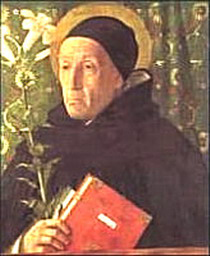
"The two eyes of the soul of man", says the Theologia Germanica, "cannot both perform their work at once:
but if the soul shall see with the right eye into eternity,
then the left eye must close itself and refrain from working, and be as though it were dead.
For if the left eye be fulfilling its office toward outward things, that is holding converse with time and the creatures;
then must the right eye be hindered in its working; that is, in its contemplation.
Therefore, whosoever will have the one must let the other go; for 'no man can serve two masters.'"
Eckhart's most famous single quote, "The Eye with which I see God is the same Eye with which God sees me",
is commonly cited by thinkers within neopaganism and ultimatist Buddhism as a point of contact between these traditions and Christian mysticism.
The central theme of Eckhart's German sermons is the presence of God in the individual soul, and the dignity of the soul of the just man.
Although he elaborated on this theme, he rarely departed from it.
In one sermon, Eckhart gives the following summary of his message:
When I preach, I usually speak of detachment and say that
Compare with the Principle view of